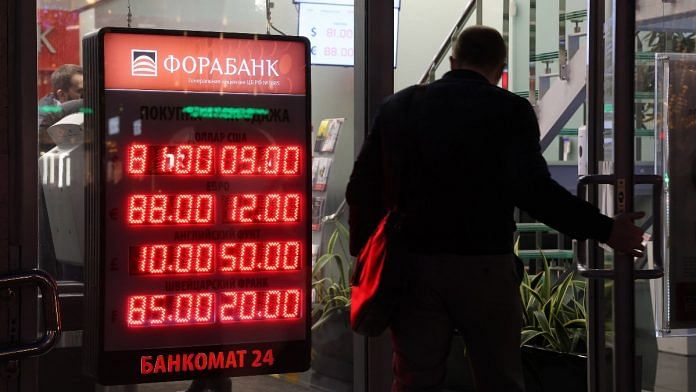The Russian invasion of Ukraine has been met with myriad sanctions imposed by many western nations. Imposing economic sanctions is often seen as an alternative to military intervention. The idea is that sanctions cause economic damage and coerce the target to change its objectionable course of action.
Although economic sanctions are widely used, their effectiveness is often debated. Recent research on sanctions has generally concluded that economic sanctions seldom change behaviour, especially those aimed at disrupting military interventions.
If national security is viewed as being at stake, sanctions simply aren’t sufficiently costly.
The severe and universal sanctions against the Iraqi occupation of Kuwait in 1990, for example, crippled the Iraqi economy but did not change the mindset of Iraq’s dictator Saddam Hussein at all.
Could sanctions imposed on Russia be effective? The western world has imposed sanctions on Russia and its predecessor, the Soviet Union, before. This long history of sanctions is sobering. Failures include the 1980 American grain embargo when Russia invaded Afghanistan in 1979 as well as export control and restrictions on technology transfer during the Cold War. The embargo did not discourage Russia from its Afghan occupation, and the export controls did not significantly affect the Communist states.
Post-Crimea sanctions
Sanctions were also imposed on Russia in 2014 when President Vladimir Putin annexed the Crimea region of Ukraine. Those sanctions didn’t force Russia to back down on its annexation.
What can we learn from this episode?
The first is that Russia was indeed vulnerable to economic pressure. Before the 2014 sanctions, trade flows between Russia and the European Union amounted to 22 per cent of Russian GDP and three per cent of EU GDP. The economic impact of full sanctions therefore was more costly for Russia than the EU. While the numbers for the EU roughly stayed the same, the share of bilateral trade in Russia’s GDP decreased to 14 per cent.
But the second lesson is that the sanctions didn’t do a lot of damage in Russia. Indeed, the EU restrictions on Russian trade and investment were designed to avoid affecting most of the EU’s exports. This reflects the difficulty reaching political consensus among a group of democracies where special interests are traded off.
In addition, Putin didn’t face internal opposition due to the 2014 sanctions because he deftly framed his military action as support for the Russian-speaking minority in Crimea. The Russian population rallied around the flag. The sanctions did not bite.
Also read: India expects West sanctions on Russia to impact key sectors, defence, engg could take big hit
History repeats?
In the wake of Russia’s invasion of Ukraine, the United States, the United Kingdom, the EU, Japan, Taiwan, New Zealand, Switzerland and Canada have all announced different sanctions against Russia.
Officials have called these sanctions severe and “without precedent.” They aren’t.
Sanctions against Iraq and Iran were more comprehensive. All foreign assets were frozen in Iraq, and almost all trade was halted; sanctions via SWIFT, the international payment system, were imposed across the broader spectrum and unexpectedly on Iran.
Countries that have been targeted with sanctions can significantly undermine the effectiveness of those measures if they aren’t speedily imposed. Russia planned the invasion of Ukraine and expected western sanctions as a consequence of its military actions.
Following the post-Crimea sanctions imposed in 2014, the Central Bank of Russia developed an alternative international payment platform, the so-called System for Transfer of Financial Messages (SPFS) — the Russian equivalent to SWIFT. SPFS is not a perfect substitute for SWIFT, but it will allow some continuity in international exchange.
Consequences of sanctions
Although western sanctions are unlikely to force Putin to abort his invasion of Ukraine, Russian citizens will certainly be hurt. The damage to civilians, particularly the poor populations of sanctioned countries, are too often ignored.
But imposing economic sanctions can become a double-edged sword that adversely affects both innocent civilians and elites alike.
Even if the sanctions are specifically targeted, there are severe ramifications for the general populace. For instance, United Nations sanctions on Iraq doubled infant and under-five mortality rates. Similarly, sanctions can also have major implications for food security — U.S. sanctions against Cuba contributed to a decline in the availability of nutritious foods and increased infectious diseases and deaths for the adult and elderly population.
More recent evidence suggests that imposing sanctions slows economic growth and development, widens the poverty gap, restricts access to food and medicines and exacerbates inequalities.
Already, we’re watching ordinary Russians bearing the brunt of the ongoing economic sanctions as the ruble has lost 40 per cent of its value and interest rates increased to 20 per cent.
Further isolating Russia and Putin from the international community also gives the Russian autocratic regime yet another opportunity to impose more repressive policies on its citizens and opposition parties. As the world rightfully fears for the Ukrainian people, we must not turn a blind eye to Russians who are also Putin’s victims.![]()
Sylvanus Kwaku Afesorgbor, Assistant Professor, Agri-Food Trade and Policy, University of Guelph and Peter A.G. van Bergeijk, Professor of International Economics and Macroeconomics, International Institute of Social Studies
This article is republished from The Conversation under a Creative Commons license. Read the original article.
Also read: West’s bid to shut down Russian economy normally an ‘act of war’, says India’s ex-envoy to Moscow
![]()



